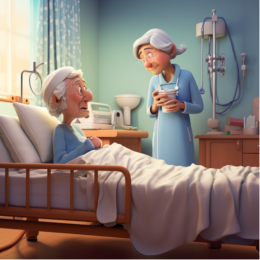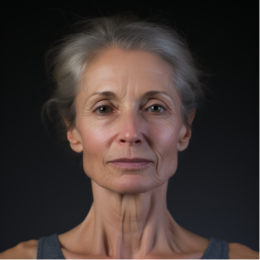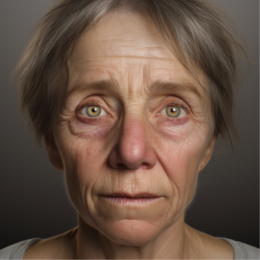Hygiene Maintenance: 6 Essential Tips for Bed-Bound Seniors

As individuals age, there may come a point when they become bed-bound, and regular activities such as bathing become increasingly challenging. From performing a bed bath for elderly to changing diapers, this article aims to provide six hygiene tips to help bed-bound seniors maintain their cleanliness and dignity.
Facts and Statistics: According to the U.S. Census Bureau, it is projected that by 2030, all baby boomers will be over age 65, expanding the older population such that 1 in every five residents will be retirement age (1). Along with this demographic shift, the Bureau predicts that by 2035, there will be 78.0 million people 65 years and older compared to 76.7 million under 18 (1).
Challenges Bed-Bound Seniors Face in Maintaining Hygiene
Bed-bound seniors face several unique challenges when maintaining personal hygiene, primarily due to their limited mobility. Everyday tasks such as bathing, oral care, and changing clothes become considerably more difficult. Extended periods in the same position can lead to pressure sores or ulcers, particularly over areas of the body in contact with the bed. These can escalate into severe complications like infections and tissue damage if not managed properly.
Additionally, oral hygiene can become a daunting task for a person in bed. The physical constraints often make regular brushing and flossing challenging, leading to a heightened risk of oral health problems. Incontinence, another common issue among bed-bound seniors, presents its difficulties. Beyond the physical implications, poor incontinence management can also have significant psychological effects, affecting an individual’s dignity and overall well-being.
Facts and Statistics: According to the Centers for Disease Control and Prevention (CDC), among adults aged 60 or over, about 2 million are entirely homebound due to chronic illness and disability (3). The American Academy of Dermatology states that pressure ulcers, a common issue among bed-bound seniors due to poor hygiene, affect approximately 2.5 million Americans yearly, contributing to nearly 60,000 deaths (2).
6 Hygiene Tips for Bed-Bound Seniors

A. Regular Bed Baths
Regular bed baths are crucial when it comes to how to bathe a bedridden person. They not only cleanse the skin, reducing the risk of infections, but also provide a sense of freshness and comfort. A bed bath should be performed with warm, not hot, water and mild, skin-friendly soap. Rinse thoroughly to avoid skin irritation. Always ensure that the senior is comfortable and covered as much as possible during the process to maintain their dignity.
Facts and Statistics: The National Institutes of Health cites that the frequency of bathing among the elderly varies greatly, but on average, seniors bathe less than once a week (4). A study in the Journal of Hospital Infection found that bed baths could reduce the risk of Methicillin-resistant Staphylococcus aureus (MRSA) colonization by 32% (5).
Oral Hygiene
Oral care is often overlooked but is essential in maintaining the person’s overall health in bed. Poor oral hygiene can lead to painful mouth conditions and infections, potentially exacerbating health issues. Brushing twice a day, flossing, and regular dental check-ups are crucial. Using an antibacterial mouthwash can also benefit seniors with limited ability to brush or floss.
Facts and Statistics: According to the Centers for Disease Control and Prevention, 2 in 3 adults aged 65 and older have gum disease (6). The American Dental Association also states that oral health can significantly affect overall health, and poor oral health can exacerbate conditions like diabetes and heart disease (7).
Hair Care
While it might seem less critical, regular hair care plays a significant role in personal hygiene for bed-bound seniors. Regularly washing the hair using a no-rinse shampoo cap can prevent scalp issues and boost the individual’s morale. A gentle massage during shampooing can also stimulate blood flow to the scalp, promoting hair health.
Facts and Statistics: While not much statistical data exists on hair care among the bedridden elderly, proper hair care plays a significant role in overall hygiene and personal comfort.
Hand and Nail Care
Hand hygiene is critical to prevent the spread of bacteria and viruses. Bed-bound seniors should have their hands cleaned regularly with mild soap and warm water. Nail care is equally important. Keep the nails trimmed and clean to prevent the accumulation of dirt and reduce the risk of scratching that can lead to skin infections.
Facts and Statistics: The CDC emphasizes the importance of hand hygiene in disease prevention. A review in The Lancet states that improved hand hygiene could reduce the risk of respiratory infections by 16% (8).
Incontinence Management
Incontinence is a common issue among bed-bound seniors. If not managed properly, it can lead to skin irritation, infections, and a reduced sense of dignity. Regularly changing elderly diapers in bed, using absorbent incontinence pads, and frequent skin cleansing can help manage this issue. Also, using barrier creams can protect the skin from moisture damage.
Facts and Statistics: A survey by the National Association for Continence found that 1 in 5 individuals over 40 suffer from incontinence, with the number being significantly higher in bed-bound seniors (9).
Assistance from Caregivers and Technology
Caring for bedridden elderly at home and maintaining hygiene is often a team effort. The role of caregivers is indispensable and includes tasks such as bed baths, oral care, and changing diapers. In addition to this, advancements in technology can make these tasks easier. Devices such as bed bath systems, automatic toothbrushes, and hair-washing trays can significantly aid the process.
Facts and Statistics: A study in the Journal of Aging and Health found that nearly 30% of adults over 65 require help with activities of daily living, including hygiene practices (10). Technology like assistive devices and telehealth services are increasingly used in senior care.
Conclusion
While being bed-bound poses numerous challenges for seniors and their caregivers, maintaining proper hygiene doesn’t have to be one of them. By implementing these six hygiene tips – regular bed baths, attentive oral care, routine hair care, thorough hand and nail care, efficient incontinence management, and leveraging assistance from caregivers and technology – we can help bed-bound seniors retain their dignity and contribute to their overall health and well-being.
References:
- U.S. Census Bureau, 2020. The Graying of America: More Older Adults than Kids by 2035. [online] Available at: https://www.census.gov/library/stories/2018/03/graying-america.html
- American Academy of Dermatology, 2020. Preventing Pressure Ulcers. Available at: https://www.aad.org/public/diseases/a-z/pressure-ulcer-prevention
- Ornstein KA, Leff B, Covinsky KE, et al. Epidemiology of the Homebound Population in the United States. JAMA Intern Med. 2015;175(7):1180–1186.
- Warren, C. et al. (2015). The Dirty Truth: Primary Caregivers and Bathing of Alzheimer’s Disease Patients. Journal of Gerontological Nursing. 41(3), 52-59.
- Climo MW, Yokoe DS, Warren DK, et al. (2013). Effect of daily chlorhexidine bathing on hospital-acquired infection. N Engl J Med. 368(6):533-42.
- CDC (2016). Periodontal Disease. Centers for Disease Control and Prevention, Oral Health. Available at: https://www.cdc.gov/oralhealth/conditions/periodontal-disease.html [Accessed 26 July 2023].
- American Dental Association (2020). Aging and Dental Health. Available at: https://www.mouthhealthy.org/en/adults-over-60
- Aiello AE, Coulborn RM, Perez V, et al. (2008). Effect of hand hygiene on infectious disease risk in the community setting: a meta-analysis. Lancet. 9;372(9633):270-81.
- National Association for Continence (2014). Statistics – Incontinence. [online] Available at: https://www.nafc.org/the-basics/
- Kasper JD, Freedman VA, Spillman BC, Wolff JL. (2014). The disproportionate impact of dementia on family and unpaid caregiving to older adults. Health Affairs (Project Hope). 33(10):1642-1649.





